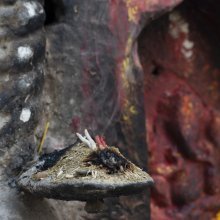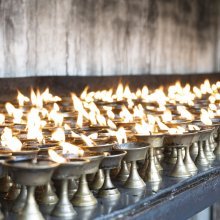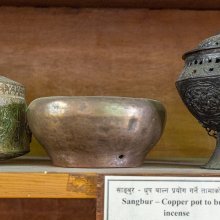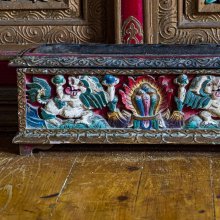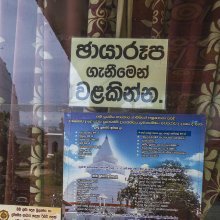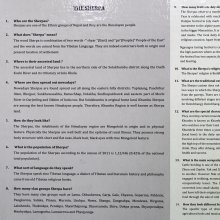Incense: 2 definitions
Introduction:
Incense means something in Buddhism, Pali, the history of ancient India. If you want to know the exact meaning, history, etymology or English translation of this term then check out the descriptions on this page. Add your comment or reference to a book if you want to contribute to this summary article.
Images (photo gallery)
(+4 more images available)
In Buddhism
Mahayana (major branch of Buddhism)
Source: Brill: Śaivism and the Tantric Traditions (mahayana)Incense is used as a material in the performance of a sacred bathing ritual dedicated to Goddess Sarasvatī, according to the seventh chapter of the Suvarṇaprabhāsottamasūtra.—In chapter 7, the Sarasvatīparivarta, the goddess Sarasvatī grants her support to the Dharma preacher through the gift of eloquence, and presents a bathing ritual with enchanted herbs for him and his audience in order to appease all disturbances. It is promised that, invoked by praise, Sarasvatī herself will appear and remove all diseases and difficulties. The ritual instructions prescribe that one should pound herbs and consecrate the powder with mantras at the time of the Puṣya constellation. A maṇḍala should be drawn with cow-dung, flowers should be scattered and gold and silver vessels filled. Four armed men and four well-adorned maidens should be placed there holding pots in their hands, thus accomplishing the protective sealing of the boundaries (sīmābandha). One should use incense, music, umbrellas, flags, banners, mirrors, arrows, spears and dhāraṇī-spells, and in due course bathe behind an image of the Buddha.

Mahayana (महायान, mahāyāna) is a major branch of Buddhism focusing on the path of a Bodhisattva (spiritual aspirants/ enlightened beings). Extant literature is vast and primarely composed in the Sanskrit language. There are many sūtras of which some of the earliest are the various Prajñāpāramitā sūtras.
India history and geography
Source: Singhi Jain Series: Ratnaprabha-suri’s Kuvalayamala-katha (history)Incense pots were burned, as part of the tasks performed to beautify the Sleeping chamber (of young ladies) in Ancient India, as depicted in the Kathās (narrative poems) such as Uddyotanasūri in his 8th-century Kuvalayamālā (a Prakrit Campū, similar to Kāvya poetry).—The Kuvalayamala (779 A.D.) is full of cultural material which gains in value because of the firm date of its composition. [...] Page 83.3-9: Here is the description of the house or the sleeping chambers of young ladies which were beautified for the reception of their husbands. The select items in this list are as follows: [e.g., burning of incense pots;] [...]

The history of India traces the identification of countries, villages, towns and other regions of India, as well as mythology, zoology, royal dynasties, rulers, tribes, local festivities and traditions and regional languages. Ancient India enjoyed religious freedom and encourages the path of Dharma, a concept common to Buddhism, Hinduism, and Jainism.
See also (Relevant definitions)
Starts with: Incense cedar, Incense tree.
Ends with: Bible frankincense, Coptic frankincense, Elemi frankincense, Frankincense, Indian frankincense, Maydi frankincense.
Full-text (+494): Dhupa, Shilarasa, Dhupana, Bhaktakara, Sutramadhyabhu, Vahnigandha, Kapyakhya, Devadhupa, Turushka, Shallakidrava, Pindaka, Pindatailaka, Sugandhika, Kapinaman, Pindata, Meruka, Vrikadhupa, Gandhapishacika, Dhupatanem, Kritrima.
Relevant text
Search found 183 books and stories containing Incense; (plurals include: Incenses). You can also click to the full overview containing English textual excerpts. Below are direct links for the most relevant articles:
Cosmetics, Costumes and Ornaments in Ancient India (by Remadevi. O.)
8. Cosmetics for Worship < [Chapter 1 - Cosmetics]
2.11. Pharmaceutical use of Incense < [Chapter 1 - Cosmetics]
1.15. Use of Sarjarasa < [Chapter 1 - Cosmetics]
The Skanda Purana (by G. V. Tagare)
Chapter 197 - The Greatness of Mūlasthāna Tīrtha < [Section 3 - Revā-khaṇḍa]
Chapter 7 - Influence of Acaleśvara (Acala-īśvara) < [Section 3 - Arbuda-khaṇḍa]
Chapter 43 - The Festival of the Swing < [Section 2 - Puruṣottama-kṣetra-māhātmya]
The Nilamata Purana (by Dr. Ved Kumari)
Apadana commentary (Atthakatha) (by U Lu Pe Win)
Commentary on Biography of the thera Soṇakoḷivisa < [Chapter 5 - Upālivagga (section on Upāli)]
Commentary on Biography of Dhūpadāyaka < [Chapter 3 - Subhūtivagga (section on Subhūti)]
Commentary on the Biography of the thera, the donor of Sīhāsana < [Chapter 2 - Sīhāsaniyavagga (lion-throne section)]
Mahabharata (English) (by Kisari Mohan Ganguli)
Section XCVIII < [Anusasanika Parva]
Section XCIX < [Anusasanika Parva]
Section C < [Anusasanika Parva]
The Linga Purana (by J. L. Shastri)
Chapter 81 - The holy rite for the release of Paśus (paśupāśa-vimocana) < [Section 1 - Uttarabhāga]
Chapter 24 - The mode of worship of Śiva (Continued) < [Section 2 - Pūrvabhāga]
Chapter 43 - The mode of gifting the eight guardians of the quarters < [Section 2 - Pūrvabhāga]
Related products
